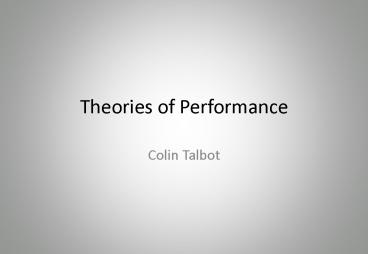Theories of Performance - PowerPoint PPT Presentation
1 / 23
Title:
Theories of Performance
Description:
'Performance', in its broadest sense, is the ultimate dependent variable in all ... brute facts' plus social construction. Shaping Performance? Shaping Performance ... – PowerPoint PPT presentation
Number of Views:165
Avg rating:3.0/5.0
Title: Theories of Performance
1
Theories of Performance
- Colin Talbot
2
ESRC Programme and Fellowship
3
Performance
- Performance, in its broadest sense, is the
ultimate dependent variable in all organisational
studies and in (most) politic science. - So thinking about performance in the public
sector is like throwing a very big rock into an
extremely large pool
4
The Book
- 1. Introduction
- SECTION I PERFORMANCE AND THEORY
- 2. Problematics of Performance
- 3. Theories and Performance
- SECTION II GOVERNMENT AND PERFORMANCE
- 4. Performance Regimes Institutions
- 5. Performance Regimes Interventions
- 6. Performance and Public Value(s)
- SECTION III PERFORMANCE OF ORGANISATIONS
- 7. Organisations
- 8. Public Organisations
- 9. Managerial and Organisational Responses
- SECTION IV CONCLUSIONS
- 10. Public Performance Multiple Models in a
Single Framework?
5
Positivism, Constructionism or Realism?
- brute facts plus social construction
6
Shaping Performance?
7
Shaping Performance
8
Shaping Performance
Ch. 4 5
Ch 7 8
Ch 2, 9 10
Ch 6
Ch 1 3
9
Performance Regimes
10
Public performance as a system
- Which institutions can try to steer
performance? - How do they do so?
- What is, and what drives organisational
performance (including interventions)
Institutions
Interventions
Organisations
11
Performance institutions
- Performance policies are more shaped by, than
shaping, institutions - Although they can also change institutional
settings (e.g. changing role of Audit Commission) - Comparing institutional arrangements across time
and space is useful (but not done much)
12
Regime Institutions
Core Executive
Legislature
Line Dept.
Judiciary
Auditors Inspectors
Partners
Professions
Citizen-users
Agency
13
Regime Interventions
Managerial-Contractual Performance
reporting Performance targets Performance
budgets Quasi-contracts
Capability Reviews Leadership Strategy and
planning Resources, people, process
mgmt (Re)organization
Systemic Competition Market-type
mechanisms League tables Benchmarking Outsourcing
Systemic Choice and Voice Rights and
entitlements User choice
14
Performance Models
15
Organisational Performance studies
Performance Management
Balanced Scorecard
Quality, Culture Values Management
In Search of Excellence
Built to Last
Good to Great
Organisational Effectiveness
Competing Values Theory
16
Developments Links
Baldrige
Balanced Scorecard
EFQM
7 S
CAE
CAF
EPSA
Speyer Awards
MAF
PSEM
Public Value
PV Scorecard
17
(Some) big recurring themes
- Generic
- Public Sector
- Defining performance as a construct? Is it
possible? - One model, many models or no models?
- Is capacity or capability part of the
performance construct or something separate? - The Halo effect and the nature of evidence
and causality
- Performance as efficiency or effectiveness or
accountability? - Who is responsible for performance?
- Levels and units of analysis problems?
- Behavioural problems
- Data reliability and validity
18
Public Organization Performance Model
Values Aim Legitimacy Governance
Strategy Leadership Structures Partnerships
Resources People Process Customer Service
Service Outputs Social Impact
Innovation Risk Management
Talbot 2009
19
Public Values
20
Public Values Relational Models
COMMUNAL SHARING Common Good Public
Interest Social Cohesion Altruism Local
governance Citizen involvement
Equality Matching Human dignity Sustainability Fut
ure Majority rule Democracy Individual rights?
Authority Ranking Regime dignity Regime
stability Political loyalty Accountability Respons
ibility
Market Pricing User democracy? Individual rights?
Public Values from Bozeman
21
Competing Public Values
22
Putting It All Together
23
COMPETING PUBLIC VALUES OF AUTHORITY SOLIDARITY
AUTONOMY EQUALITY
Core Executive
Legislature
Line Dept.
Judiciary
PERFORMANCE REGIME
Auditors Inspectors
Partners
Professions
Citizen-users
PERFORMANCE MODEL

